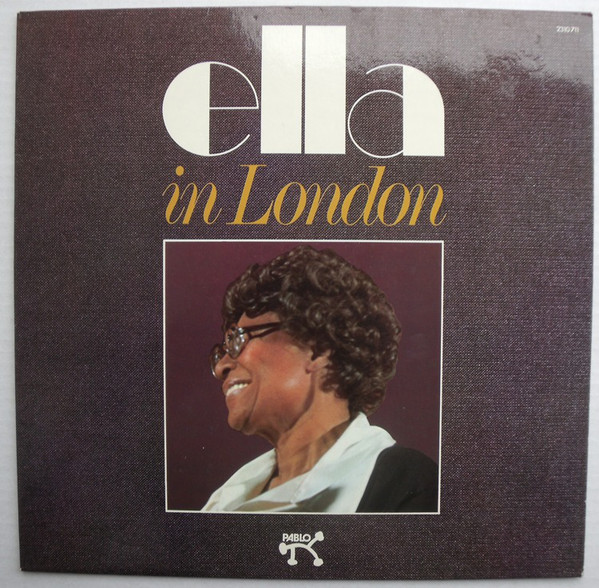Now Playing
Current DJ: Alex Archibeque
Adrianne Lenker symbol from abysskiss (Saddle Creek) Add to Collection
Requests? 773-DJ-SONGS or .(JavaScript must be enabled to view this email address)
 by Josh Friedberg
by Josh Friedberg
No one swung a song like Ella Fitzgerald. The “First Lady of Song” earned her reputation as a “musician’s singer” because of her unparalleled facility with scat singing and her relentless rhythmic attack on songs like “Blue Skies” and “How High the Moon.” She could, of course, also sing with a sweet, lovely tone that could make you melt on a ballad.
But by the mid-1970s, her voice had lost some of its legendary pristine clarity. But she could still swing like nobody else. And on Ella in London, recorded live at Ronnie Scott’s nightclub in 1974, the adoring audience and the first-class material spur Ella on to create an exceptionally enjoyable live album—on par with the more well-known Mack the Knife: Ella in Berlin from 1960, and perhaps even more consistently surprising than that classic.
The Penguin Guide to Jazz rated this album higher than Mack the Knife, giving it 4 stars out of 4, which surprised me as someone much more versed in the more generally lauded and acclaimed periods of Ella’s career, especially at Verve Records from the mid-1950s to the mid-‘60s.
But giving it a listen, even if her voice sounds older, you get the immediate sense that she is still in prime form rhythmically. That wink in how she sings “Sweet Georgia Brown”—“You know I don’t lie—not much”—backed by the bounce of the Tommy Flanagan Quartet make this opener an immediate candidate for one of the album’s highlights.
Flanagan’s bluesy piano on the following track, the George and Ira Gershwin classic “They Can’t Take That Away from Me,” helps Fitzgerald build to a slow but rollicking climax. And while she admits that she only played Cole Porter’s “Ev’ry Time We Say Goodbye” in England—“It never became a hit anywhere else”—so that she was worried about forgetting the words, she sings it with tenderness and intimacy in a way perhaps more befitting the lyric than the orchestral version on Ella Fitzgerald Sings the Cole Porter Song Book from 1956.
Some tracks build from downtempo to (more) up-tempo, and “The Man I Love” is the biggest example of this. Performing another Gershwin standard, Fitzgerald and the quartet switch to a more progressively swinging approach a couple minutes in, and Fitzgerald quotes “Diamonds Are a Girl’s Best Friend” and Billie Holiday’s “Fine and Mellow” towards the end. Overall, the performance feels spontaneous, fresh, and impressively swinging.
The album’s greatest surprises come in on the group’s version of Duke Ellington’s “It Don’t Mean a Thing (If It Ain’t Got That Swing),” which incorporates Fitzgerald scatting impressions of genres like country, soul, and classical for several minutes before going into the tune. This track, more than any other, alerted me as a listener to the uniqueness of this album.
The group’s version of Carole King’s “You’ve Got a Friend” may not hit the same emotional heights as King’s version on Tapestry, but, of course, Fitzgerald’s melodic and rhythmic inventiveness carry the day. Her biggest scat showcase comes next, on the fast-swinging “Lemon Drop.” It might not dazzle as much as “How High the Moon” from the aforementioned Mack the Knife: Ella in Berlin, whose length frankly makes it sound like Fitzgerald is running a very impressive endurance contest.
The tender “The Very Thought of You,” here a duet with guitarist Joe Pass, once again reveals Fitzgerald’s improvisatory gifts and humor when she mixes up the lyrics. Finally, the six-minute closer, a Fitzgerald original called “Happy Blues,” finds the band in swinging form once again, riding out the groove of a highly satisfying gig.
Overall, I highly recommend this recording as an underrated example of a jazz vocal giant in her later career.
Next entry: The Dead Milkmen @ House of Vans on Thursday July 12!
Previous entry: First Time: First Game | July 11th at Martyrs’